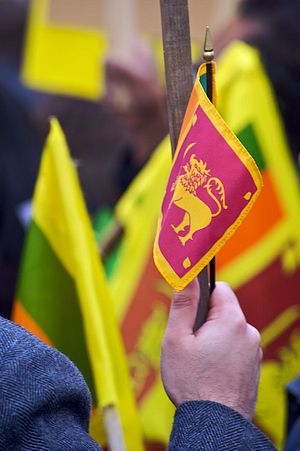Sri Lanka’s nationwide local government election has produced some troubling results. The Sri Lanka People’s Front, a new party backed by former strongman Mahinda Rajapaksa – who ruled in an increasingly authoritarian fashion from 2005 to 2015 – won convincingly.
The election results are another example of the former president’s continued relevance in the war-torn island nation’s politics. They are also a reminder that the current government has fallen well short of expectations and become increasingly unpopular.
It’s hard to imagine significant chaos occurring at this scale and at such a level following a local election. Yet that’s precisely what happened at the top echelons of government in Colombo. The poll results clearly deepened cracks within the ruling alliance; confusion and ambiguity followed the February 10 vote, as it wasn’t clear that the coalition was staying together.
Formed after a parliamentary election in 2015, the power-sharing arrangement between President Maithripala Sirisena’s Sri Lanka Freedom Party and Prime Minister Ranil Wickremesinghe’s United National Party has become increasingly tenuous.
The tension within the alliance was quite evident during the recent electoral campaign since the two parties contested separately. The partnership is complicated by the fact that the two parties are historical rivals. What’s more, Sirisena unexpectedly unseated Rajapaksa during the country’s January 2015 presidential election largely due to support from the United National Party – in spite of the fact that Sirisena was a cabinet member of Rajapaksa’s administration and a longtime member of the Sri Lanka Freedom Party. (Rajapaksa remains a member of the Sri Lanka Freedom Party.)
The local poll has been framed largely as a referendum on the government’s performance. Nevertheless, the fact that Rajapaksa, his acolytes, and others associated with hardline Sinhala-Buddhist nationalism have demanded that parliament be dissolved (claiming that the present administration no longer has a mandate to govern the country) is ludicrous.
In the Sri Lankan press, it was widely reported that Sirisena had asked Wickremesinghe to resign the premiership, and that the prime minister refused to step down.
A continuation of the existing coalition looks like the best possible outcome under the circumstances. The alliance could have fallen apart, and that’s still a possibility before the next round of national elections, which are expected in 2020.
Some analysts and commentators have already proclaimed that, given the local poll results, there’s no chance for major reform in the next two years, even though Sirisena campaigned on an ambitious agenda in 2015.
A bleak assessment about the future of the present administration is more than warranted. However, it’s important to keep in mind that the prospects for deeper reform with the current government have been quite poor for some time, and that any result from this local poll was not going to change that.

































